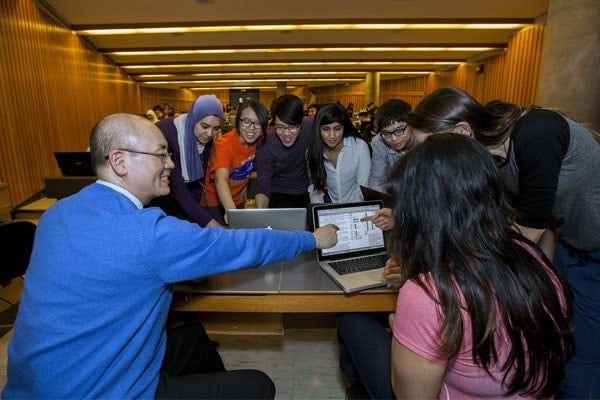
Animation, interactive quizzes, exercises, videos and more: online learning at U of T
Published: April 17, 2015
An initiative of the Ontario government is helping U of T instructors use technology to deliver their course content in ever more innovative ways.
Thanks to the Ontario Shared Online Course Fund, seven undergraduate courses were offered in the fall of 2014. For the fall of 2015, another 10 projects are being developed: two new, fully online courses and eight new sets of course modules.
The modules – which will include animations, interactive quizzes, videos and self-paced exercises – are “parts of courses” which will be designed for re-use and sharing across courses, departments, and even institutions. They will complement teaching in "brick and mortar" classrooms as well as online courses.
The U of T projects are among 102 selected for funding across the province. “Our success rate was very high, and we’re extremely pleased to be involved this way,” says Laurie Harrison, the university’s director of online learning strategies.
The upcoming round of modules will be integrated in math, science and social science courses, including psychology, social work and nursing. A key feature is that instructors will participate in the design themselves – working in teams in which they’re assisted by graduate students or educational technology specialists.
“Developing capacity within different program areas is something that’s occurring as a result of this process,” says Harrison.
Already, U of T offers 25 undergrad online courses and another 10 in such second-entry programs as dentistry or physician assistants – as well as 46 graduate courses that are fully online. In the past year, registrations in fully online courses reached more than 6,000.
The new modules are eclectic, with titles such as “Digital Labcoat”, “Ethics in Engineering”, and “Cognitive Psychology and Cognitive Neuroscience for Designers and Engineers”. The names alone reveal the interdisciplinary reach and scope of the online initiative.
 William Ju is a lecturer in U of T’s Human Biology program, whose students often take courses in psychology, cell and systems biology, and neuroscience.
William Ju is a lecturer in U of T’s Human Biology program, whose students often take courses in psychology, cell and systems biology, and neuroscience.
“I had asked my students how similar the concepts and lectures in various departments were, and they mentioned there was usually a great deal of overlap in many courses,” he says.
Ju believes that online lessons shared between courses could greatly reduce this redundancy, allowing students to “drill deeper” during class time. One infers that they would also help departments keep abreast of others’ activities.
The module he’s developing (“Re-Usable Learning Modules and Objects for Instruction in Neuroscience”) will feature animations and quizzes, all designed to show students how the brain learns. In turn, says Ju, “the feedback from these types of modules will further help us to understand how students learn.”
In so doing, instructors such as Ju will be experimenting with the idea of a hybrid classroom – one that gives students the opportunities for discussion, lectures, group and online work: a full menu of learning options.
The online modules will also allow them to “flip” classrooms: in this model, traditional class work (such as lectures and videos) is provided online, so that “homework” (knowledge application) can occur in class, through discussion and group work.
Ju relishes the opportunity to offer his students choices; he recently completed a pilot course in which they were given the option of studying either a) traditionally, b) online in real time, or c) online at their own pace. Making the online students feel connected (both to class and course material) was “an exciting challenge,” he says.
It’s clear that technology is playing an integral part in U of T’s effort to increase student engagement and active learning – whether by replacing activities that were once done in class, or freeing up space so that classroom time can be better used.
“What can a course look like?” asks Harrison, affirming that with the help of initiatives such as the Ontario Shared Online Course Fund, U of T will continue to explore the best use of student time and instructor resources. “This isn’t just about bolting additional resources onto the ones that exist. This is about actually redesigning courses, from top to bottom.”
(Read about transforming the undergrad experience at U of T.)



